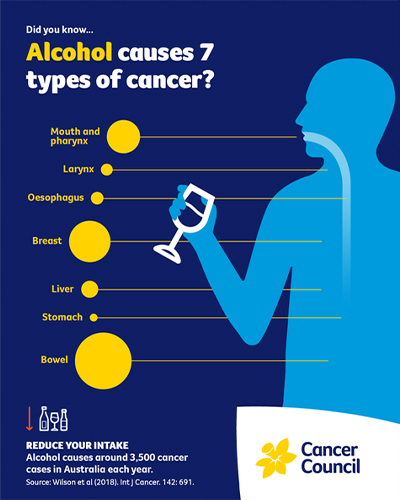
The world-leading cancer agency – the International Agency for Research on Cancer (IARC) – has classified alcoholic drinks and the chemical present in these drinks (ethanol) as a Group 1 carcinogen, which means there is no doubt that it causes cancer.
If you drink alcohol, we recommended you stay within National Health and Medical Research Council low risk drinking guidelines:
- Healthy adults should drink no more than 10 standard drinks a week and no more than four standard drinks on any one day to reduce the risk of alcohol-related disease or injury. The less you drink, the lower your risk of harm from alcohol.
- Children and people under 18 years should not drink alcohol to reduce the risk of injury and other harms to health.
- To prevent harm from alcohol to their unborn child, women who are pregnant or planning a pregnancy should not drink alcohol. For women who are breastfeeding, not drinking alcohol is safest for their baby.
What is a standard drink?
A standard drink contains 10 grams of alcohol. Alcoholic drinks sold in Australia are required to state on the label the approximate number of standard drinks they contain. You can use this information to estimate how much alcohol you are drinking.
Different types of alcoholic drinks contain different amounts of alcohol. However, the type of alcohol (wine, beer or spirits) doesn’t make any difference to cancer risk.
One standard drink is equal to:
- One 375ml can or stubbie of mid-strength beer
- 285ml middy/half pint of full-strength beer
- 100ml of wine (13% alcohol)
- 30ml of spirits (40% alcohol)
Smoking and alcohol
The combined effects of smoking and drinking alcohol are much greater than the individual risks from either smoking or drinking alcohol alone. This is because alcohol makes it easier for the mouth and throat to absorb the cancer-causing chemicals in tobacco.
Alcohol and weight
Alcoholic drinks contain energy (kilojoules, kJ). In fact, alcohol contains few nutrients but is very energy dense. The energy found in alcohol is often called ‘empty kilojoules’. Alcohol mixed with other sugary drinks contains even more energy. Alcohol use can easily contribute to weight gain. Excess body fat has been linked to 13 types of cancer including bowel, breast (after menopause), kidney, and liver. So, drinking alcohol increases cancer risk, and gaining weight can add to this cancer risk.
Alcohol.Think Again
The Alcohol.Think Again education program is delivered by the Mental Health Commission in partnership with Cancer Council WA. The program informs the WA community of the range of alcohol-related harms, including cancer, and ways to minimise alcohol-related risk.
Visit the Alcohol.Think Again website to view the campaigns, find tips to reduce your drinking, access online tools (e.g., What is a standard drink?), and connect with support services.
Policy
Cancer Council WA works closely with other non-government organisations to advocate for improvements to the environment through policy change to reduce harm from alcohol use, including cancer. There are many policy options that are known to be effective. Cancer Council’s recommendations to reduce harms caused by alcohol are outlined in the National Cancer Prevention Policy.
Follow us on Twitter @AlcoholPolicyWA to keep up to date on our activities and key policy issues.